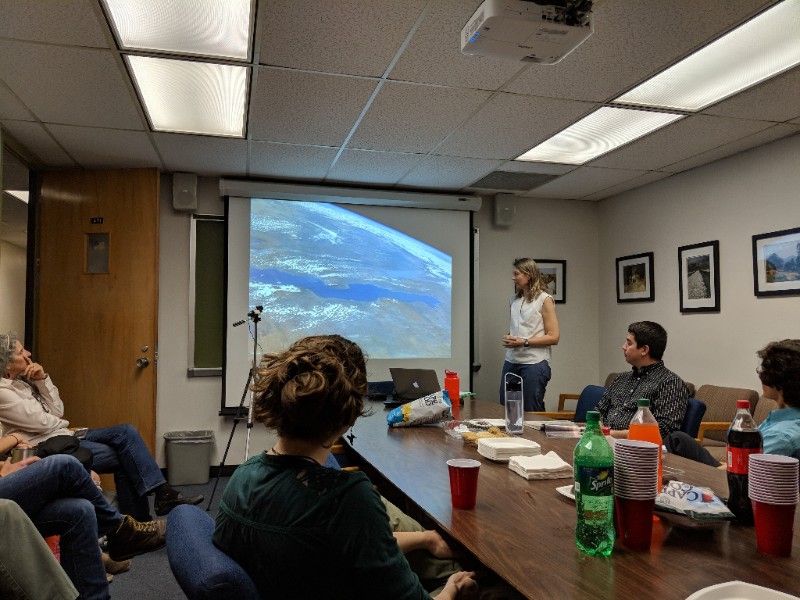 On March 1st, the NRM Africa group met for the lecture, “Integrating Natural and Social Science to Improve Conservation and Fisheries Management on Lake Tanganyika,” by Dr. Catherine O’Reilly, Illinois State University. Dr. O’Reilly is an Associate Professor in the Department of Geography, Geology, and the Environment at Illinois State University. Her research focuses on water quality, with an interest in human impacts and climate change. For over a decade, Dr. O’Reilly has been working on Lake Tanganyika, East Africa, which is a critical resource for the surrounding countries. She is currently involved in the CLEAT project, which aims to understand the relative importance of climate change and fishing pressure for fish yields and long-term sustainability. Dr. O’Reilly also is involved in the Global Lake Ecological Observatory Network (GLEON) as well as in projects in Central Illinois that explore the extent to which changes in agriculture management can improve water quality. Dr. O’Reilly has a B.A. from Carleton College in environmental Studies and a Ph.D. from the University of Arizona in Geosciences. As part of the 2007 Intergovernmental Panel on Climate Change, Dr. O’Reilly shares the Nobel Peace Prize with Al Gore and 2000 other scientists.
On March 1st, the NRM Africa group met for the lecture, “Integrating Natural and Social Science to Improve Conservation and Fisheries Management on Lake Tanganyika,” by Dr. Catherine O’Reilly, Illinois State University. Dr. O’Reilly is an Associate Professor in the Department of Geography, Geology, and the Environment at Illinois State University. Her research focuses on water quality, with an interest in human impacts and climate change. For over a decade, Dr. O’Reilly has been working on Lake Tanganyika, East Africa, which is a critical resource for the surrounding countries. She is currently involved in the CLEAT project, which aims to understand the relative importance of climate change and fishing pressure for fish yields and long-term sustainability. Dr. O’Reilly also is involved in the Global Lake Ecological Observatory Network (GLEON) as well as in projects in Central Illinois that explore the extent to which changes in agriculture management can improve water quality. Dr. O’Reilly has a B.A. from Carleton College in environmental Studies and a Ph.D. from the University of Arizona in Geosciences. As part of the 2007 Intergovernmental Panel on Climate Change, Dr. O’Reilly shares the Nobel Peace Prize with Al Gore and 2000 other scientists.
Dr. O’Reilly’s lecture focused on Lake Tanganyika fisheries and the impact of climate change on social practices. Lake Tanganyika is a tropical East African Rift Valley lake, with high freshwater biodiversity, high fish yields, high species endemism, and high human population growth in surrounding communities. Fisheries in this region are important economically and as a natural resource for local people. However climate change has already impacted Lake Tanganyika— in the past 100 years primary productivity has decreased by 30%, and over a 7-year period there has been a 15% decline in algal biomass. Fish populations are projected to decrease along with productivity, while water temperature is expected to increase.
Through the CLEAT project, Dr. O’Reilly and other researchers have found that the behavior and engagement of fishermen have shifted in response to climate-based changes to the lake. Gear changes have been adopted that center on technological developments, catches have become increasingly monopolized by juvenile fish, and use of community drying racks has decreased as fishermen struggle to avoid monitoring by authorities. Social networks and mobile technologies have become increasingly utilized as a way to catch and sell fish while remaining undetected by fisheries officers. Dr. O’Reilly hopes to continue to collect social and natural science data surrounding fisheries and Lake Tanganyika to better understand how climate change is impacting these systems.